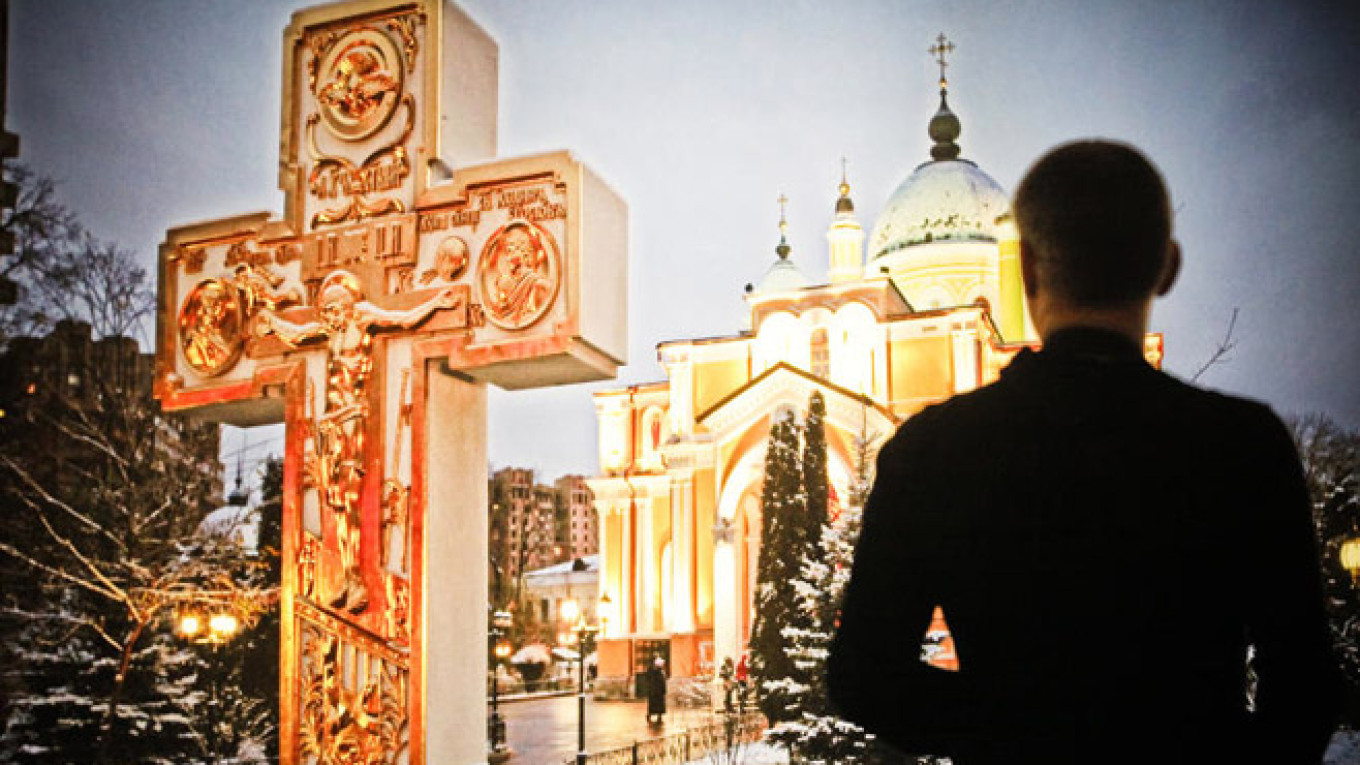Last Friday, a video deemed offensive to the Moscow Patriarchate of the Russian Orthodox Church was ruled "extremist" by a city court in Vladimir. While Alexander Soldatov — chief editor of Credo.ru, the website that posted the offending video — now could also be tried for extremism, the real defendants should be Russia's extremism law and the officials who are helping expand its reach and influence across the country.
The charge should be violating religious freedom and related rights of Russia's religious minorities or anyone who offends or competes with Russia's dominant church.
Russia's lists of materials banned as extremist reached 2,241 items this year.
The video, which Soldatov posted last year, shows court bailiffs attempting to seize religious relics from a parish of the independent Russian Orthodox Autonomous Church and includes words that are critical of Moscow Patriarchate representatives. The Autonomous Church had been given these relics when it separated from the Moscow Patriarchate in 1988.
Russia first enacted its extremism law in 2002, partly in response to concerns about terrorism. But the law, which prescribes sanctions on those promoting the "exclusivity, superiority or inferiority of citizens" based on religion, was broadened in 2007 to include even nonviolent actors, thus reaching far beyond any fears of extremism linked to terrorism.
As of the release of this year's annual report of the U.S. Commission on International Religious Freedom, Russia's list of materials banned as extremist had reached 2,241 items. Merely possessing banned works can trigger fines, while the mass distribution, preparation or storage of such materials can result in a four-year prison term.
Which Russians are most affected by the extremism law? First and foremost, it is the country's Muslims, who often are wrongly labeled security threats — a serious error — which along with various forms of repression can lead to the very radicalization that officials are claiming to combat under the guise of the extremism law.
A court in 2007 banned the Russian translations of 14 Quran commentaries by Turkish theologian Said Nursi, due to his assertion of Islam's exclusivity, not because of any security threats.
Examples of other banned texts are a sermon delivered more than a century ago in 1900 by Metropolitan Sheptytsky, a candidate for Catholic sainthood; and at least 70 Jehovah's Witness texts.
In August 2013, Russia banned the entire international website of the Jehovah's Witnesses because it contained phrases from previously prohibited brochures. Examples of these phrases include "what the Bible teaches," "draw near unto Jehovah" and "come follow me."
? In early 2014, a regional court overturned this ruling, ending Russia's embarrassment of being the only nation in the world to ban the pacifist group's website.
Clearly, concerns about terrorism and other security matters don't fully explain either the content of Russia's extremism law or its application. A fuller explanation must include Russia's tendency to target groups that appear to challenge what many officials, including President Vladimir Putin, proclaim is the Moscow Patriarchate's role as sole guardian of Russia's cultural identity. Other religious groups have no place in this cultural identity, and so they are not protected.
This tendency would explain why the law allows officials to target nonviolent citizens who threaten no one. It would explain the prosecution of human rights blogger Maxim Yefimov in the Karelia region after he criticized the Moscow Patriarchate in December 2011. And of course, it would explain why Alexander Soldatov risks being prosecuted today for a video that offended the Russian Orthodox Church.
Partly because of its extremism law and its application, Russia's government remains on the U.S. Commission on International Religious Freedom's Tier-2 list of serious violators of freedom of religion or belief.
In monitoring religious freedom abuses in various countries, the U.S. commission applies international human rights standards included in such documents as the Universal Declaration of Human Rights and the International Covenant on Civil and Political Rights.
We are not alone in our conclusion. Based on these same standards, the European Union reiterated in March of this year its strong opposition to the extremism law. Two years ago, in June 2012, the Council of Europe's Venice Commission reached the same conclusion.
The Venice Commission — composed of independent experts on constitutional law — stated that Russia's extremism law lacked clarity, invited arbitrary application and was overly broad, thus violating international law.
Coupled with the alarming erosion of other human rights in Russia, particularly since Putin's return to the presidency, the extremism law and its chilling application raise a disturbing question.
Do fundamental freedoms, including freedom of religion or belief, have a future in Russia? How Russia ultimately handles people like Soldatov and his website may help provide the answer to this question.
Katrina Lantos Swett is chairwoman of the U.S. Commission on International Religious Freedom (USCIRF). Robert P. George is a USCIRF vice chairman.
A Message from The Moscow Times:
Dear readers,
We are facing unprecedented challenges. Russia's Prosecutor General's Office has designated The Moscow Times as an "undesirable" organization, criminalizing our work and putting our staff at risk of prosecution. This follows our earlier unjust labeling as a "foreign agent."
These actions are direct attempts to silence independent journalism in Russia. The authorities claim our work "discredits the decisions of the Russian leadership." We see things differently: we strive to provide accurate, unbiased reporting on Russia.
We, the journalists of The Moscow Times, refuse to be silenced. But to continue our work, we need your help.
Your support, no matter how small, makes a world of difference. If you can, please support us monthly starting from just $2. It's quick to set up, and every contribution makes a significant impact.
By supporting The Moscow Times, you're defending open, independent journalism in the face of repression. Thank you for standing with us.
Remind me later.


